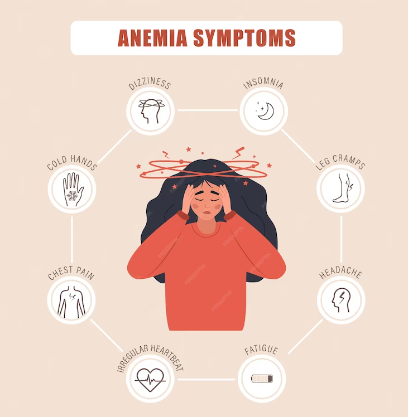Anaemia

Anaemia is a condition characterized by a deficiency of red blood cells or hemoglobin, leading to a reduced ability of the blood to carry oxygen to tissues. Treatment for anemia depends on the underlying cause and severity of the condition.
Iron Supplementation: The most common cause of Anaemia is iron deficiency. Iron supplements, often in the form of ferrous sulfate or ferrous gluconate, are prescribed to replenish iron stores and boost red blood cell production.
Vitamin B12 and Folate Supplementation: Deficiencies in vitamin B12 or folate can also cause anemia. Supplementation with these vitamins, either through oral or injectable forms, helps correct the deficiency and support red blood cell production.
Erythropoiesis-Stimulating Agents (ESAs): In certain types of anaemia, such as that associated with chronic kidney disease or chemotherapy, ESAs like epoetin alfa or darbepoetin alfa may be used to stimulate the bone marrow to produce more red blood cells.
Treatment of Underlying Conditions: Anaemia caused by chronic diseases or inflammatory conditions may require addressing the root cause, such as managing inflammatory diseases or treating chronic kidney disease.
Blood Transfusions: In severe cases or acute situations, blood transfusions may be necessary to rapidly increase the number of red blood cells and improve oxygen delivery to tissues.
Dietary Changes: In cases of nutritional Anaemia, adjusting the diet to include iron-rich foods (e.g., red meat, leafy greens), vitamin B12-rich foods (e.g., meat, dairy, eggs), and folate-rich foods (e.g., leafy greens, legumes) is recommended.
Lifestyle Modifications: Lifestyle changes, such as quitting smoking and avoiding excessive alcohol consumption, can contribute to improved overall health and support anemia management.
